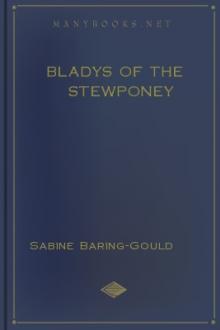The Broom-Squire - Sabine Baring-Gould (life books to read .txt) 📗

- Author: Sabine Baring-Gould
Book online «The Broom-Squire - Sabine Baring-Gould (life books to read .txt) 📗». Author Sabine Baring-Gould
Iver's eyes, thoughts, were distracted from the game. He lost money--five shillings, and Jonas urged him to play for higher stakes.
Then Mehetabel laid her needlework in her lap, and said--
"No, Iver, do not. You have played sufficiently, and have lost enough. Go home."
Jonas swore at her.
"What is that to you? We may amuse ourselves without your meddling. What odds to you if he loses, so long as I win. I am your husband and not he."
But Iver rose, and laughingly said:--
"Better go home with a wet jacket than with all the money run out of my pocket. Good-night, Bideabout."
"Have another shot?"
"Not another."
"She put you up to this," with a spiteful glance at Mehetabel.
"Not a bit, Jonas. Don't you think a chap feels he's losing blood, without being told he is getting white about the gills."
The Broom-Squire sulkily began to gather up the cards.
"What sort of a night is it, Mehetabel? Go to the door and see," said he.
The girl rose and opened the door.
Without, the night was black as pitch, and in the light that issued the raindrops glittered as they fell. In the trees, in the bushes, on the grass, was the rustle of descending rain.
"By Jove, it's worse than ever," said Iver: "lend me a lantern, or I shall never reach home."
"I haven't one to spare," replied Bideabout; "the hogs and calves must be tended, and the horse, Old Clutch, littered down. Best way that you have another game with me, and you shall stay the night. We have a spare room and bed."
"I accept with readiness," said Iver.
"Go--get all ready, Matabel. Now, then! you cut, I deal."
CHAPTER XVII.
DREAMS.
Iver remained the night in the little farm-house. He thought nothing as he lay in bed of the additional shillings he had lost to Jonas, but of the inestimable loss he had sustained in Mehetabel.
The old childish liking he had entertained for her revived. It did more than revive, it acquired strength and heat. As a boy he had felt some pride and self-consequence because of the child whom he had introduced into the Christian Church, and to whom he had given a name. Now he was elated to think that she was the most beautiful woman he had seen, and angry with the consciousness that she was snatched from him.
Why had he not returned to Thursley a day, half a day, earlier? Why had Fate played such a cruel game with him? What a man this Jonas Kink was who had won the prize. Was he worthy of it? Did he value Mehetabel as he should? A fellow who could not perceive beauty in a landscape and see the art in his drawings was not one to know that his wife was lovely, or if he knew it did so in a stupid, unappreciative manner. Did he treat Mehetabel kindly; with ordinary civility? Iver remembered the rebukes, the slights put on her in his own presence.
Iver's bedroom was neat, everything in it clean. The bed was one of those great tented four-posters which were at the time much affected in Surrey, composed of covering and curtains of striped--or pranked--cotton, blue and white. Mehetabel, in the short while she had been in the Punch-Bowl, had put the spare room in order. She had found it used as a place for lumber, every article of furniture deep in dust, and every curtain rent. The corners of the room had been given over for twenty years as the happy hunting-ground of spiders. Although Bideabout had taken some pains to put his house in order before his marriage, repairs had been executed only on what was necessary, and in a parsimonious spirit. The spare room had been passed over, as not likely to be needed. To that as to every other portion of the house, Mehetabel had turned her attention, and it was now in as good condition to receive a guest as the bedrooms in the Ship Inn.
Presently Iver went to sleep, lulled by the patter of the rain on the roof, on the leaves, and the sobbing of the moist wind through the ill-adjusted casement.
As he slept he had a dream.
He thought that he heard Thursley Church bells ringing. He believed he had been to church to be married. He was in his holiday attire, and was holding his bride by the hand. He turned about to see who was his partner, and recognized Mehetabel. She was in white, but whiter than her dress and veil was her bloodless face, and her dark brows and hair marked it as with mourning.
There was this strange element in his dream, that he could not leave the churchyard.
He endeavored to follow the path to the gate, outside which the villagers were awaiting them with flowers and ready to cheer; but he was unable to reach it. The path winded in and out among the gravestones, and round and round the church, till at length it reached the tomb of the murdered sailor.
All the while the ringers were endeavoring to give the young bridal pair a merry peal, and failed. The ropes slid from their hands, and only the sexton succeeded in securing one, and with that he tolled. Distinctly Iver saw the familiar carving of the three murderers robbing and killing their victim. He had often laughed over the bad drawing of the figures--he laughed now, in sleep.
Then he thought that he heard Mehetabel reproach him for having returned, to be her woe. And that between each sentence she sobbed.
Thereupon he again looked at her.
She was beautiful, more beautiful than ever--a beauty sublimated, rendered almost transparent. As he looked she became paler, and the hand he held grew colder. Now ensued a strange phenomenon.
She was sinking. Her feet disappeared in the spongy turf that oozed with water after the long rain. Her large dark eyes were fixed on him entreatingly, reproachfully.
Then she was enveloped to her knees, and as she went down, the stain of the wet grass and the soil of the graveyard clay rose an inch up her pure white garment.
She held his hand tenaciously, as the only thing to which she could cling to save her from being wholly engulfed.
Then she was swallowed up to her waist, and he became aware that if he continued to clasp her hand, she would drag him under the earth. In his dream he reasoned with her. He pointed out to her that it was impossible for him to be of any service to her, and that he was jeopardizing his own self, unless he disengaged himself from her.
He endeavored to release his hand. She clung the more obstinately, her fingers were deadly cold and numbed him, yet he was resolute in self-defence, and finally freed his hand. Then she sank more rapidly, with despair in the upturned face. He tried to escape her eyes, he could not. It was a satisfaction to him when the rank grass closed over them and got between the lips that were opened in appeal for help. Then ensued a gulp. The earth had swallowed her up, and in dream, he was running for his pallet and canvas to make a study of the spot where she had sunk, in a peculiarly favorable light. He woke, shivering, and saw that the gray morning was looking in at his window between the white curtains.
His hand, that had felt so chill, was out of the bed, and the coverlet had slid off him, and was heaped on the floor.
The wind had shifted, and now pressed the clouds together, rolled them up and swept them into the lumber-house of clouds below the horizon. He dressed leisurely, shook himself, to shake off the impression produced by his dream, and laughed at himself for having been disturbed by it.
When he came downstairs he found that both Mehetabel and Jonas were already on their feet, and that the former was preparing breakfast. Her eyes were red, as if she had been crying.
"How did you sleep?" she asked, with faint smile--"and what were your dreams?"
"They say that the first dream in new quarters comes true," threw in the Broom-Squire; "but this is the idle chatter of old wives. I make no count of it."
Mehetabel observed that Iver started and seemed disconcerted at this question relative to his dream. He evaded an answer, and she saw that the topic was unpleasant, and to reply inconvenient. She said no more; and Jonas had other matters to think about more substantial than dreams. Yet Mehetabel could not fail to perceive that their guest was out of tune. Was he annoyed at having lost money, or was he in reality troubled by something that had occurred during the night? An hour later Iver prepared to leave.
"Come with me a little way," he pleaded with the hostess, "see me safe off the premises."
She did as was desired, though not without inner reluctance. And yet, at the same time she felt that with his departure a something would be gone that could not be replaced, a light out of her sky, a strain of music out of her soul.
The white fog lay like curd at the bottom of the Punch-Bowl. Here and there a tree-top stood above the vapor, but only as a bosky islet in the surface of mist, dense and chill. The smoke from the chimneys of the squatter houses rose like steaming springs, but the brick chimneys were submerged. So dense was the fog that it muffled all sound, impeded the breath, struck cold to the marrow. It smelt, for the savors of hog-pen and cow-stall were caught and not allowed to dissipate.
A step, and those ascending the side of the great basin were out of the mist, and in sunshine, but it still held their feet to the knees; another step and they were clear, and then their shadows were cast, gigantic, upon the white surface below, and about each head was a halo of light and rainbow tints.
Every bush was twinkling as hung with diamonds of the purest water. Larks were trilling, pouring forth in song the ecstasy that swelled their hearts. The sky was blue as a nemophyla, and cloudless.
As soon as Iver and Mehetabel had issued from the fog and were upon the heath, and in the sunshine, she stayed her feet.
"I will go no further," she said.
"Look," said he, "how the fog lies below at the bottom of the Punch-Bowl, as though it were snow. Above, on the downs all is sunshine."
"Yes, you go up into the light and warmth," answered she. "I must back and down into the cold vapors, cold as death."
He thought of his dream. There was despondency in her tone.
"The sun will pierce and scatter the vapors and shine over and warm you below."
She shook her head.
"Iver," she said, "you may tell me now we are alone. What was your dream?"
Again he appeared disconcerted.
"Of what, of whom did you dream?"
"Of whom else could I dream but you--when under your roof," said he with a laugh.
"Oh, Iver! and what did you dream about me?"
"Arrant nonsense. Dreams





Comments (0)